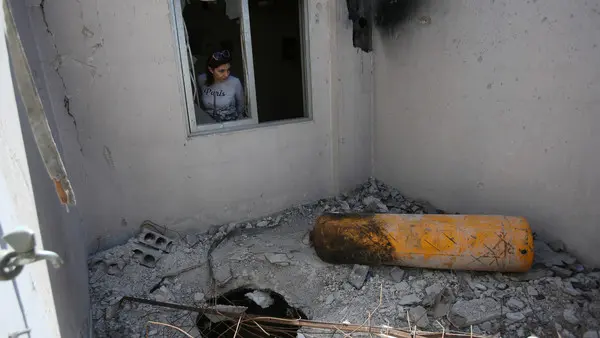Organization for the Prohibition of Chemical Weapons investigation finds ‘reasonable grounds to believe’ helicopter dropped two cylinders containing gas, killing 43.

THE HAGUE, Netherlands (AP) — An investigation by the global chemical weapons watchdog established there are “reasonable grounds to believe” Syria’s air force dropped two cylinders containing chlorine gas on the city of Douma in April 2018, killing 43 people.
A report published Friday by a team from the Organization for the Prohibition of Chemical Weapons offered the latest confirmation that the regime of Syrian President Bashar Assad used chemical weapons during his country’s grinding civil war.
“The use of chemical weapons in Douma – and anywhere – is unacceptable and a breach of international law,” OPCW Director-General Fernando Arias said.
The organization said that “reasonable grounds to believe” is the standard of proof consistently adopted by international fact-finding bodies and commissions of inquiry.
Syria, which joined the OPCW in 2013 under pressure from the international community after being blamed for another deadly chemical weapon attack, does not recognize the investigation team’s authority and has repeatedly denied using chemical weapons.
Despite the latest findings, bringing perpetrators in Syria to justice remains a long way off. Syria’s ally Russia has, in the past, blocked efforts by the UN Security Council to order an International Criminal Court investigation in Syria.
“The world now knows the facts – it is up to the international community to take action, at the OPCW and beyond,” Arias, a veteran Spanish diplomat, said.
The report said there are “reasonable grounds to believe” that during a government military offensive to recapture Douma, at least one Syrian air force Mi8/17 helicopter dropped two yellow cylinders on the city.
One of the cylinders hit the roof of a three-story residential building and ruptured, “rapidly released toxic gas, chlorine, in very high concentrations, which rapidly dispersed within the building killing 43 named individuals and affecting dozens more,” according to the report.
A second cylinder burst through the roof of another building into an apartment below and only partially ruptured, “mildly affecting those who first arrived at the scene,” the report added.
Syrian authorities refused the investigation team access to the sites of the chlorine attacks. The country had its OPCW voting rights suspended in 2021 as punishment for the repeated use of toxic gas, the first such sanction imposed on a member nation.
The painstaking investigation by the organization’s team was set up to identify perpetrators of chemical weapon attacks in Syria, built on earlier findings by an OPCW fact-finding mission that chlorine was used as a weapon in Douma.
The investigators also interviewed dozens of witnesses and studied the blood and urine of survivors as well as samples of soil and building materials, according to the watchdog agency.
The investigators also carefully assessed and rejected alternative theories for what happened, including Syria’s claim that the attack was staged and that bodies of people killed elsewhere in Syria were taken to Douma to look like victims of a gas attack.
The report found that the two cylinders carrying chlorine were modified and filled at the Dumayr air base and the helicopter or helicopters that dropped them were under control of the Syrian military’s elite Tiger Force.
The OPCW team “considered a range of possible scenarios and tested their validity against the evidence they gathered and analyzed to reach their conclusion: that the Syrian Arab Air Forces are the perpetrators of this attack,” the organization said in a statement.
The ongoing conflict that started in Syria more than a decade ago has killed hundreds of thousands and displaced half the country’s prewar population of 23 million.
Source: www.timesofisrael.com

